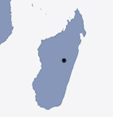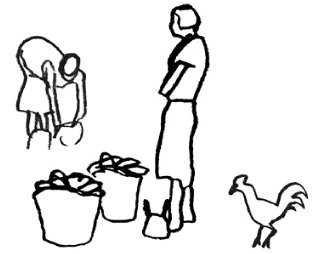 |
||||||||
 |
||||||||
durrell wildlife conservation trust |
||||
The red island of Madagascar, so called for the colour of the iron-rich soils, is a wondrous yet desperately poor country. But what makes Madagascar so special? As the oldest island in the world it was a fragment that broke away as the continents were moving apart over 160 million years ago. Isolated for so long, over 95% of the plants and animals on Madagascar are found nowhere else; leading it to be described at the 'eighth continent' for the richness of it's biological diversity. The island's unique flora and fauna, which consistently amazes all who experience it, has increasingly become restricted to tiny fragments of remaining forest or wetland habitat. Over three quarters of the population exist on less than $2 per day and are almost completely reliant on the natural environment for their survival. Unfortunately, this diversity of life is under great pressure from human actions leading to habitat loss and degradation and, as a result Madagascar, as a global diversity hotspot, is one of the world's most important conservation priorities. At Durrell we believe that for conservation to succeed in Madagascar we must work equally with people and wildlife. We have therefore dedicated the last 25 years to work hand in hand with local communities to raise their standards of living and find ways of reducing their pressure on remaining natural areas. Madagascar is now our largest conservation programme and we have 45 dedicated staff working to save species in 9 field sites around the country with some of the rarest animals in the world. Madagascar needs your help more than ever. Both people and wildlife are struggling to survive as remaining forests and wetlands continue to get cut down and converted. Help us continue to make a difference to both the wildlife and people of Madagascar. |
||||
 |
||||
Madagascar has a population of around 20 million people approximately three quarters of these live outside urban areas in the countryside. Working closely with people is essential if we are to save the country's unique wildlife. The country is one of the least developed countries in the world and the majority of people survive on less than $2 per day, which is the international poverty line. Education levels are low and access to primary education is limited. Equally Madagascar has the 13th fastest growing population in Africa and family sizes are becoming larger, increasing demands for food and materials. Poverty is one of the main driving forces behind deforestation. people cut and burn forests (a process known locally as tavy) to make way for farming and cattle grazing. But as land becomes rapidly depleted of it's nutrients, this process continues to expand. Working with communities to find ways to improve their well-being and reduce pressers on their forests, is absolutely central to saving species on the island. Durrell has developed a locally led community conservation model. we work with villages to identify the major challenges they face in using the natural environment and we link efforts to improve these problems to conservation initiatives. Through this process, we have supported the creation of village associations that lead local protection and monitoring efforts. these projects have led to reductions in burning and greater protection of remaining forest. Equally, through support from donors like the Jersey Overseas Aid Committee, we have been able to make a tangible difference to people's well-being by providing greater access to clean water, primary education, health and improved food security. Our projects now reach over 50,000 people around our field sites. |
||
Andrew Terry Ph.D. |
||
Head of Field Programmes |
||
Durrell Wildlife Conservation Trust |
||
durrell wildlife conservation trust |
||||
www.durrell.org |
||
Matt Falle Art ~ Madgascar, Durrell Wildlife Conservation Trust |
||